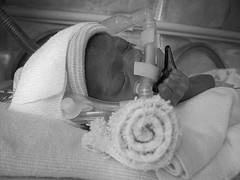 My son had several surgeries involving general anesthesia before the age of three. These surgeries were life saving and unavoidable, but I fear they have not come without consequence to his developing brain. He currently suffers from childhood apraxia of speech, and I wonder, were the anesthetics to blame for this neurological disorder?
My son had several surgeries involving general anesthesia before the age of three. These surgeries were life saving and unavoidable, but I fear they have not come without consequence to his developing brain. He currently suffers from childhood apraxia of speech, and I wonder, were the anesthetics to blame for this neurological disorder?
According to a new study, animal tests have found anesthetics to be harmful to a developing baby’s brain.
The Organic Consumers Association reports:
Commonly used anaesthetics may be causing brain damage in people, especially babies who receive them while their brains are still developing.
Associate Professor Andrew Davidson, an anaesthetist at the Royal Children’s Hospital in Melbourne, said there was mounting evidence in animals that a range of anaesthetics used on humans were toxic for the brain and could cause lasting damage, including learning and memory difficulties.
He said recently published studies of five-day-old monkeys showed that when they were given ketamine, an anaesthetic commonly used in hospitals, the drug caused some of their brain cells to die. When these monkeys were assessed at two and three years of age, they had significant learning deficits.
There was also evidence that propofol, midazolam, isoflurane, desflurane and sevoflurane – all commonly used drugs in humans – caused rats’ brain cells to die, affecting their ability to complete simple tasks.
Professor Davidson said large studies of children who had received anaesthetics as babies were under way to see if the animal findings could be validated.
Just like anytime I hear news of toxic substances in products newly revealed, I can’t do anything about the past. None of my son’s surgeries were elective. The first one occurred when he was only four-months-old. He would not be here today without these procedures, but this new information regarding anesthetics is certainly to be taken to heart anytime parents are considering surgery for their child.
Photo: ![]() Some rights reserved by ceejayoz
Some rights reserved by ceejayoz
Leave a Reply